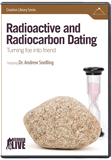
Teeth That Could Change Everything
Is Homo sapiens twice as old as was previously believed? Or are evolutionists simply twice as credulous?
News Source
Is Homo sapiens twice as old as was previously believed? Or are evolutionists simply twice as credulous?
Last month, researchers from Tel Aviv University shocked the world, reporting the discovery of what appear to be Homo sapiens teeth that are an alleged 400,000 years old. If true, that would approximately double the length of time evolutionists believe our species has walked the earth—no small shift in the evolutionary story of human origins. Not only that, but one researcher claims it could mean humans arose (supposedly) in Israel, contrary to the popular “out of Africa” view of man’s origins.
The teeth were found in Qesem Cave, where excavations have been ongoing since 2004. A team led by archaeologist Avi Gopher estimated the age of the teeth based on the sedimentary layer in which they were found. Acknowledging that more research is needed to confirm his team’s conclusion, Gopher said the research “changes the whole picture of evolution.”
Cambridge University archaeologist Paul Mellars doesn’t dispute the research, but he notes that identifying the species based only on teeth is tricky. “Based on the evidence they’ve cited, [their claim is] a very tenuous and frankly rather remote possibility,” he said.
When puzzling outliers like these teeth appear, the correspondence in the model begins to fall apart. Which is wrong: the old-earth dating methods, or the evolutionary model?
If the Tel Aviv University team cannot recover further evidence for their claim, scientists may quickly forget about the teeth and assume they cannot be H sapiens. But if further evidence is found that confirms the presence of H. sapiens in Israel nearly half a million years ago, how will evolutionists react? Evolution needs time, and archaeological discoveries—based on old-earth dating methods—have given evolutionists a model about where humans were, and when. When puzzling outliers like these teeth appear, the correspondence in the model begins to fall apart. Which is wrong: the old-earth dating methods, or the evolutionary model? If the team does find more evidence, evolutionists may be labeling the cave’s treasures an “unsolved mystery” for many years to come.
For More Information: Get Answers
Remember, if you see a news story that might merit some attention, let us know about it! (Note: if the story originates from the Associated Press, FOX News, MSNBC, the New York Times, or another major national media outlet, we will most likely have already heard about it.) And thanks to all of our readers who have submitted great news tips to us. If you didn’t catch all the latest News to Know, why not take a look to see what you’ve missed?
(Please note that links will take you directly to the source. Answers in Genesis is not responsible for content on the websites to which we refer. For more information, please see our Privacy Policy.)
Recommended Resources

Answers in Genesis is an apologetics ministry, dedicated to helping Christians defend their faith and proclaim the good news of Jesus Christ.
- Customer Service 800.778.3390
- Available Monday–Friday | 9 AM–5 PM ET
- © 2025 Answers in Genesis






